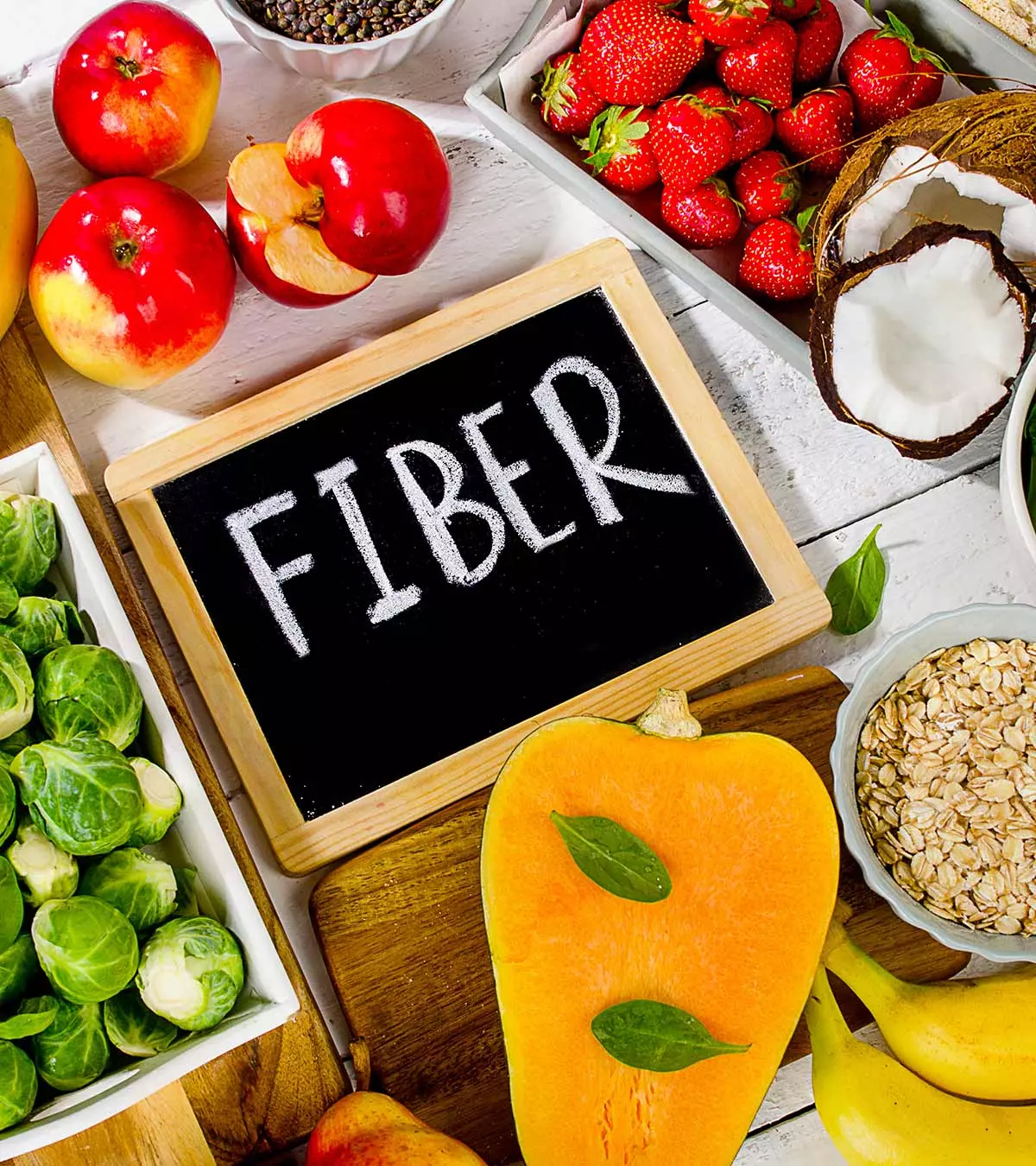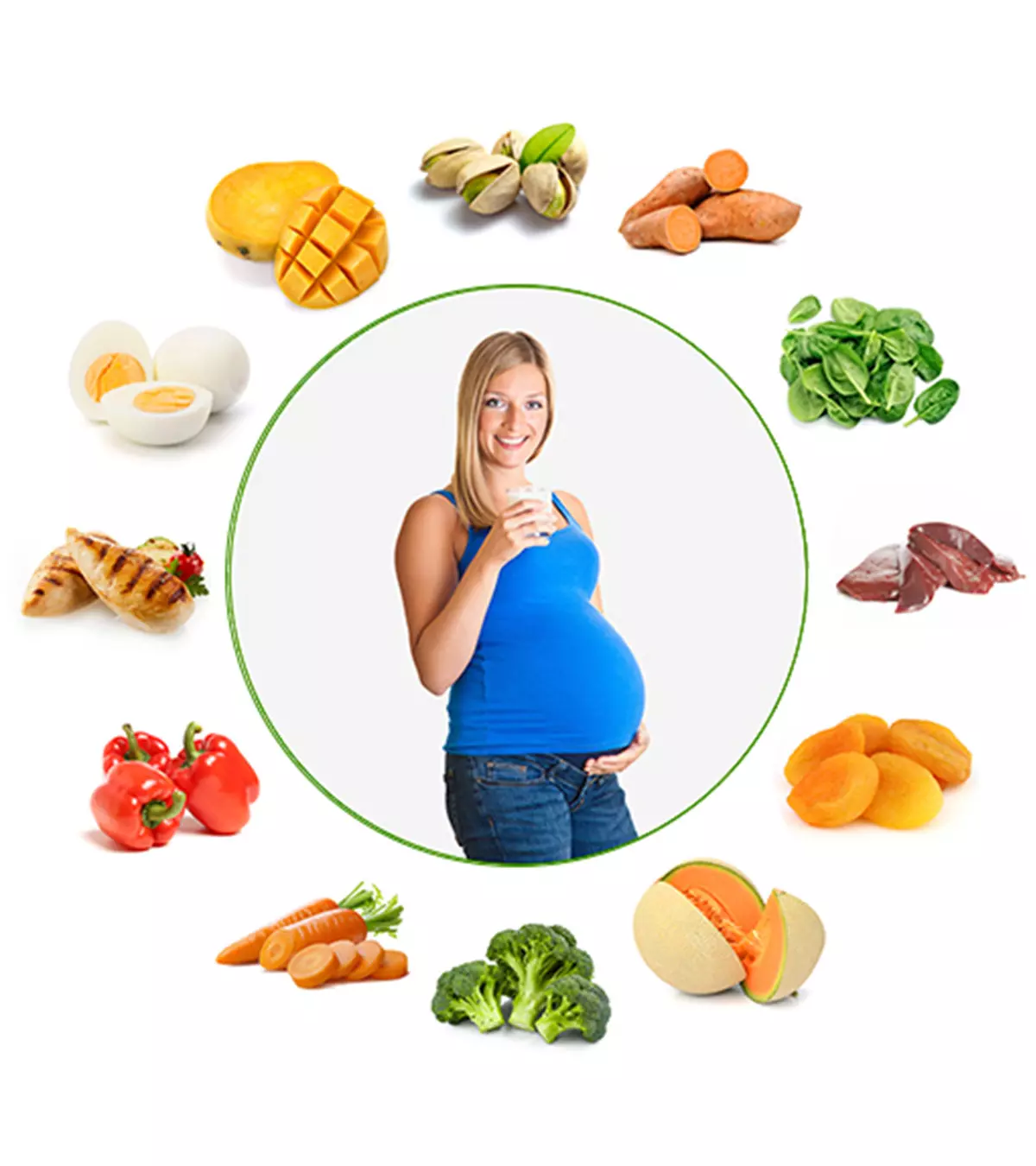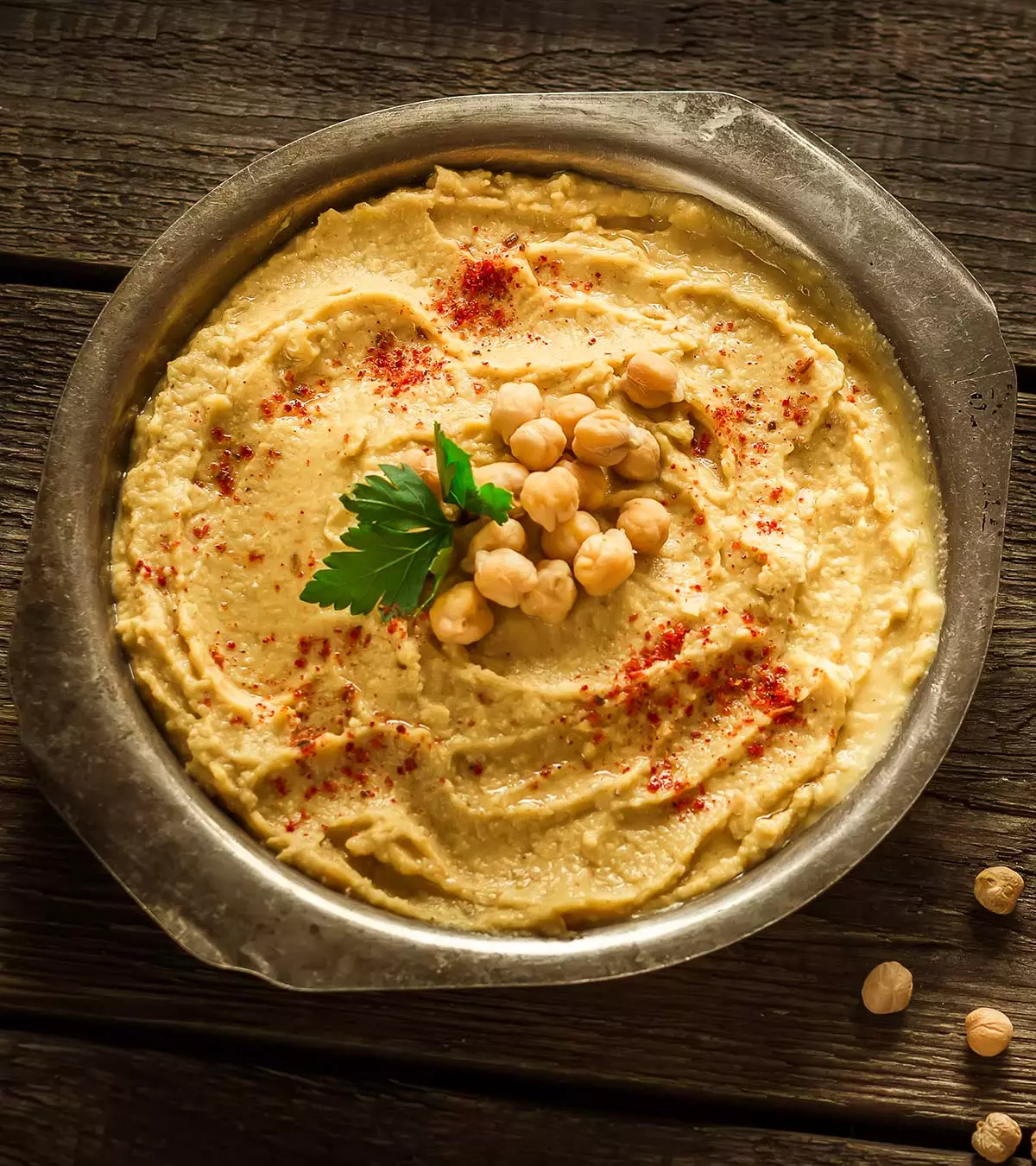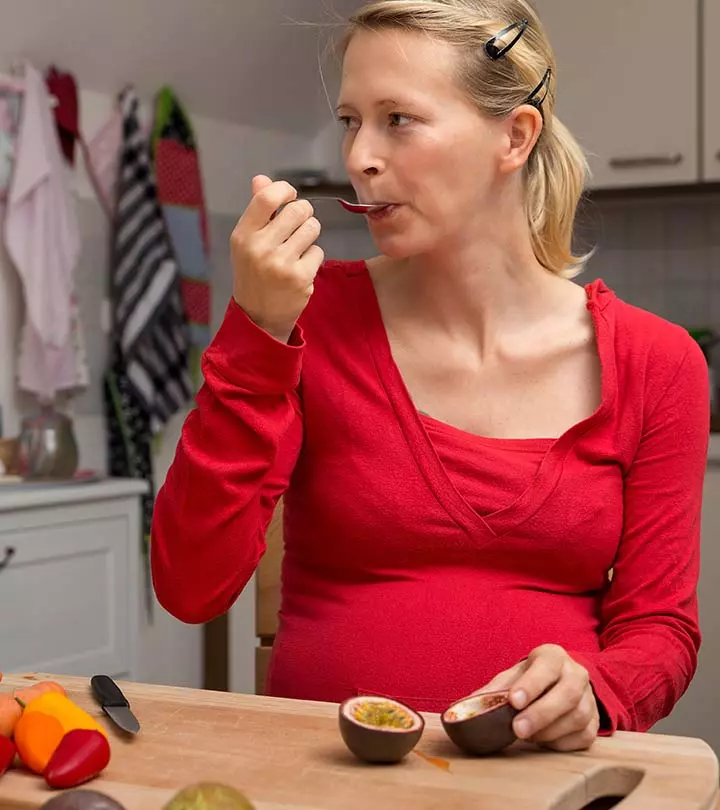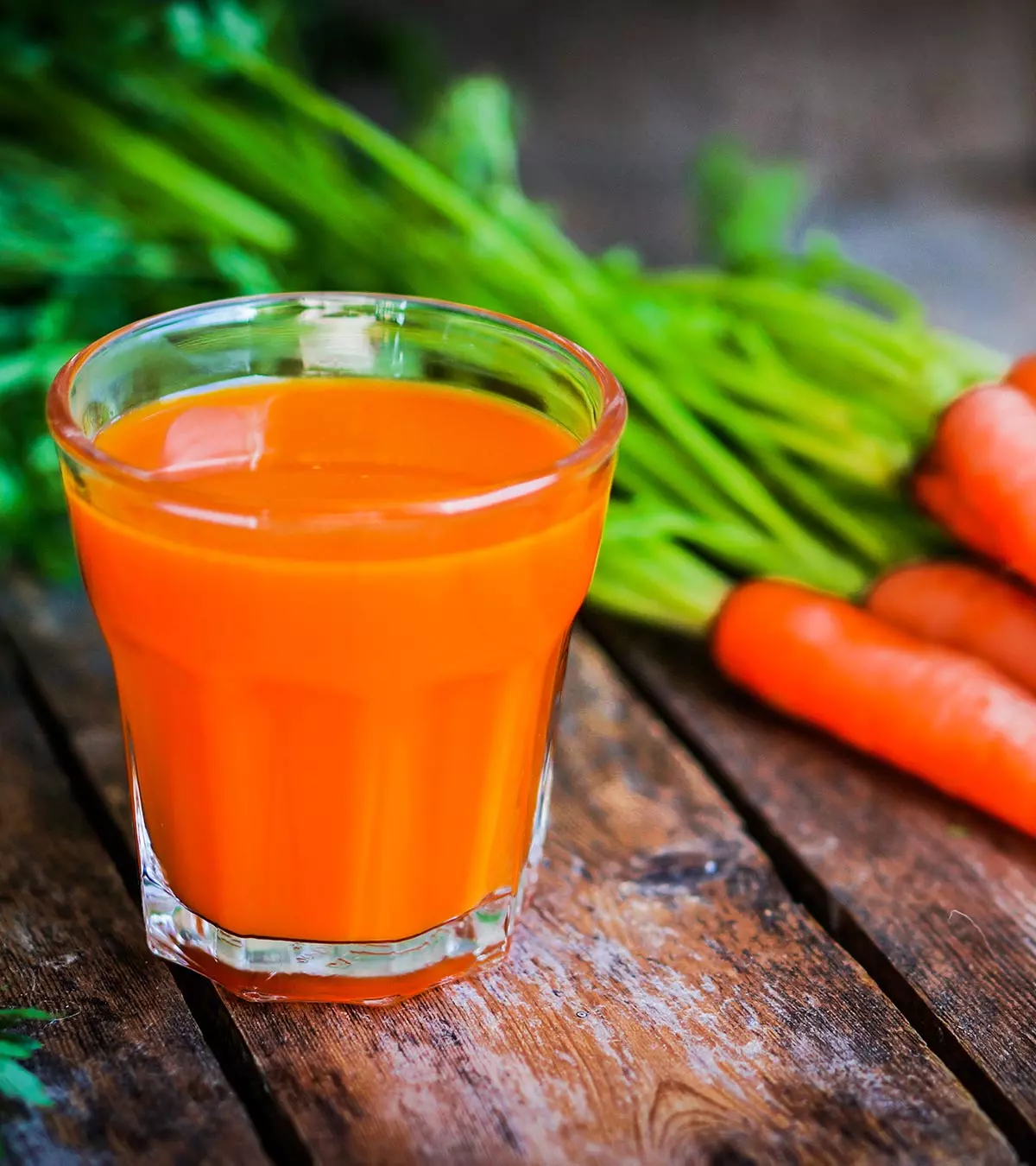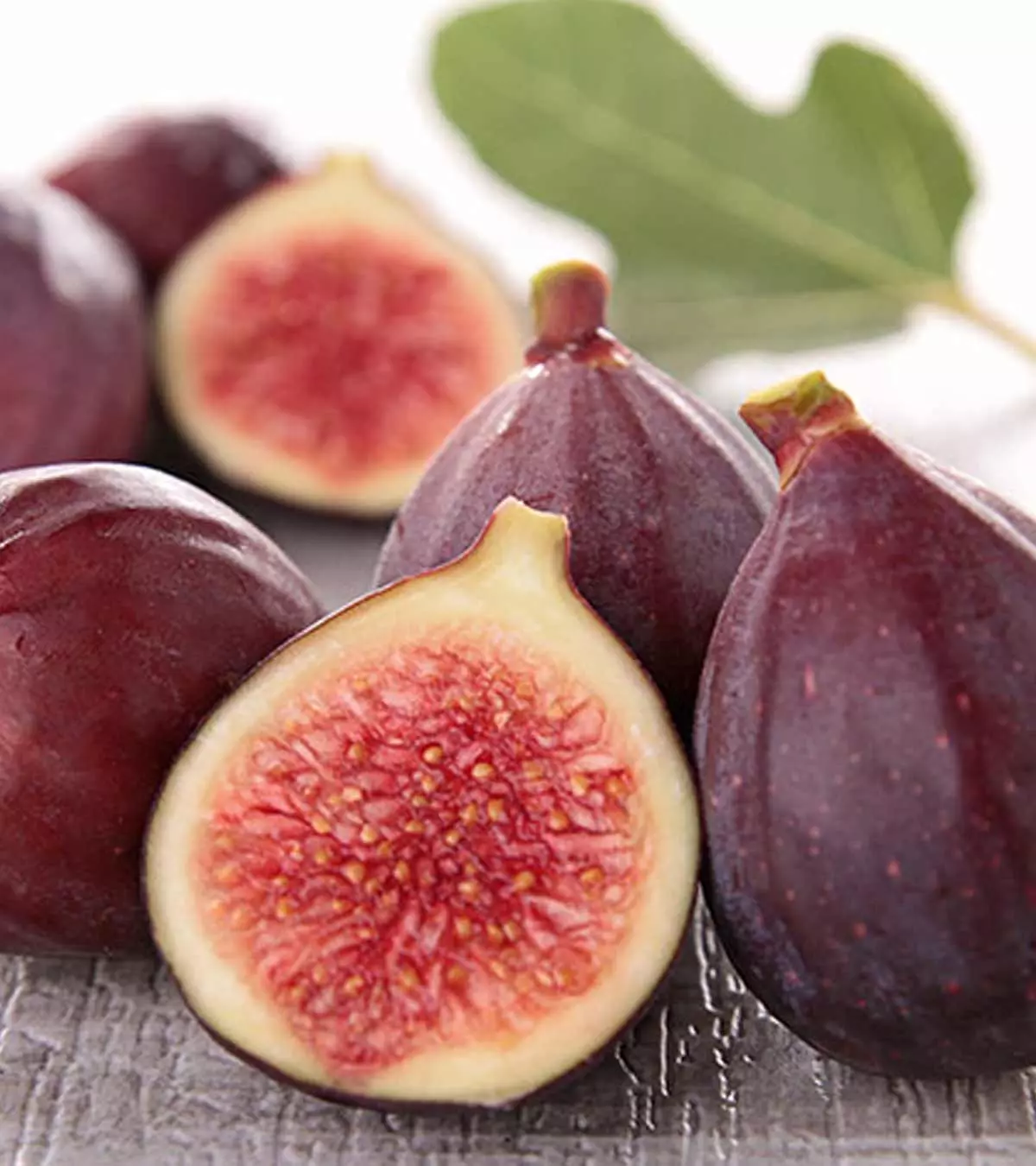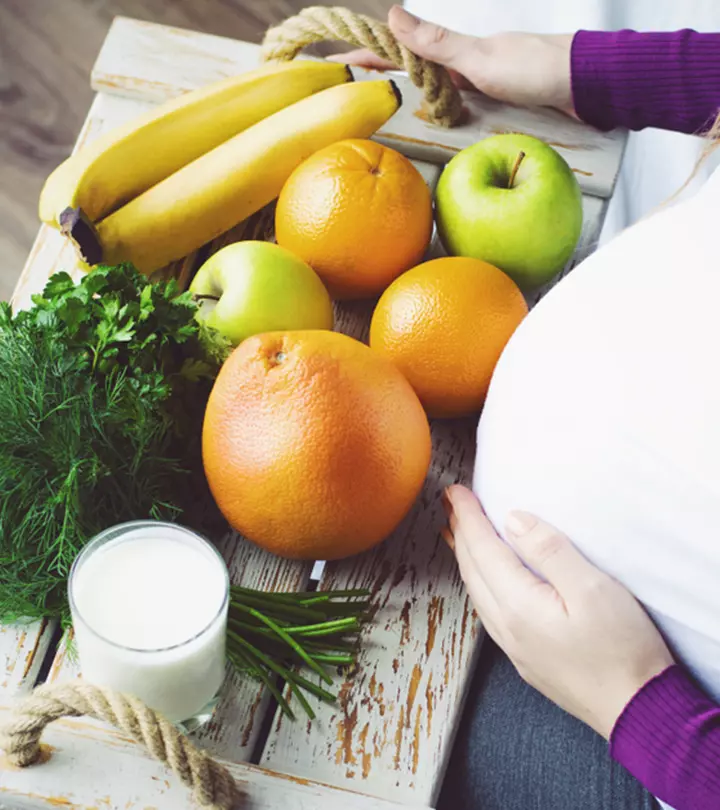
Image: Shutterstock
An adequate intake of vitamin A in pregnancy can benefit maternal and fetal well-being. The nutrient plays a crucial role in fetal development and keeps the mother healthy. You can get vitamin A through various food items. Vitamin A supplements may also be considered if your doctor prescribes them. Despite the benefits of vitamin A, its excess intake may increase the risk of congenital malformationsiStructural or functional abnormalities that develop during the fetal period. . Read on to know the importance of vitamin A in pregnancy and the right amount to consume.
Key Pointers
- Vitamin A supports fetal bone health and boosts maternal immunity and tissue repair.
- Good sources of vitamin A include liver, sweet potatoes, carrots, spinach, pumpkin, and fish.
- Pregnant women should aim to consume about 770 micrograms of vitamin A daily.
- Vitamin A supplements should only be taken when prescribed by a doctor during pregnancy.
- Excessive intake of vitamin A (more than 4500 micrograms) can lead to toxicities and fetal malformation, especially if taken in early pregnancy.
Why Is Vitamin A Important During Pregnancy?
Vitamin A is an essential micronutrient available abundantly in most foods and occurs in two forms (1).
- Preformed vitamin A (from animal sources): It includes retinol and retinyl estersiA kind of vitamin A used to make supplements and fortified foods. directly absorbed in the body.
- Provitamin A carotenoids(from plant sources): It includes beta-caroteneiA natural dye that gives color to fruits and vegetables and gets converted into vitamin A in the human body. that needs to be converted to retinol in the body for absorption.
Vitamin A contributes to the expecting mother’s and the fetus’ health in the following ways (2).
For the mother:

Image: Shutterstock
- Helps in postpartum tissue repair
- Maintains normal eyesight
- Strengthens immune system
- Maintains the functional capacity of the female reproductive system
For the fetus:
- Assists in bone development
- Promotes fetal organ development and bone health
- Helps in the growth and formation of epithelial tissueiA thin protective layer of tissue that forms the outer covering of the body and also lines the glands and organs.
 Quick fact
Quick factHow Much Vitamin A Is Required During Pregnancy?
According to the National Institute of Health, the recommended dietary allowance (RDA) of vitamin A for pregnant women between the ages of 19 and 50 years is 770 micrograms (3).
RAE is the standard measurement of vitamin A and stands for retinol activity equivalents (RAE). It indicates the potency of the vitamin A source (retinol or provitamin A).
One microgram (mcg) of RAE is equivalent to any one of the following values.
- 1 mcg retinol
- 2 mcg beta-carotene from supplementation
- 12 mcg beta-carotene from diet
- 24 mcg alpha-carotene
- 24 mcg beta-cryptoxanthiniA naturally occurring fruit pigment that is also present in human blood and tissues.
Sometimes, vitamin A is also measured in international units (IU). The conversions of IU to RAE are as follows.
- 1 IU retinol = 0.3 mcg RAE
- 1 IU supplemental beta-carotene = 0.3 mcg RAE
- 1 IU dietary beta-carotene = 0.05 mcg RAE
- 1 IU dietary alpha-carotene or beta-cryptoxanthin = 0.025 mcg RAE
 Quick fact
Quick factWhat Are The Good Sources Of Vitamin A?
The following foods are rich sources of vitamin A.
| Food | Serving | Micrograms (mcg) RAE per serving | Percentage daily value |
|---|---|---|---|
| Beef liver, pan fried | 3 ounces | 6,582 | 731 |
| Sweet potato, baked in skin | 1 whole | 1,403 | 156 |
| Spinach, frozen, boiled | ½ cup | 573 | 64 |
| Pumpkin pie, commercially prepared | 1 piece | 488 | 54 |
| Carrots, raw | ½ cup | 459 | 51 |
| Ice cream, French vanilla, soft serve | 1 cup | 278 | 31 |
| Cheese, ricotta, part skim | 1 cup | 263 | 29 |
| Herring, Atlantic, pickled | 3 ounces | 219 | 24 |
| Milk, fat free or skim, fortified with vitamin A | 1 cup | 149 | 17 |
| Cantaloupe, raw | ½ cup | 135 | 15 |
| Peppers, sweet, red, raw | ½ cup | 117 | 13 |
| Mangos, raw | 1 whole | 112 | 12 |
| Breakfast cereals, fortified with 10% of the DV for vitamin A | 1 serving | 90 | 10 |
| Egg, hard boiled | 1 large | 75 | 8 |
| Black-eyed peas (cowpeas), boiled | 1 cup | 66 | 7 |
| Apricots, dried, sulfured | 10 halves | 63 | 7 |
| Broccoli, boiled | ½ cup | 60 | 7 |
| Salmon, sockeye, cooked | 3 ounces | 59 | 7 |
| Tomato juice, canned | ¾ cup | 42 | 5 |
| Yogurt, plain, low fat | 1 cup | 32 | 4 |
| Tuna, light, canned in oil, drained solids | 3 ounces | 20 | 2 |
| Baked beans, canned, plain or vegetarian | 1 cup | 13 | 1 |
| Summer squash, all varieties, boiled | ½ cup | 10 | 1 |
| Chicken, breast meat and skin, roasted | ½ breast | 5 | 1 |
| Pistachio nuts, dry roasted | 1 ounce | 4 | 0 |
Source: Vitamin A, National Institute of Health.
A balanced diet should supply the required vitamin A during pregnancy for optimal nutrition. However, if you have any micronutrient deficiencies, your physician may recommend vitamin supplements. Do not take supplements unless prescribed by a healthcare provider since they may have side effects.
Is Too Much Vitamin A Bad During Pregnancy?

Image: Shutterstock
An intake of more than 4500mcg RAE (15,000 IU) of dietary vitamin A or 3000mcg RAE (10,000 IU) of supplemental vitamin A can lead to toxicity, also termed hypervitaminosis. A few studies state that vitamin A toxicity during the early stages of pregnancy could lead to congenital malformations (2) (4). Hence, consume foods rich in vitamin A as part of a balanced diet and avoid supplementation during pregnancy unless prescribed by your doctor.
The symptoms of vitamin A toxicity include the following.
- Dizziness
- Nausea and vomiting
- Loss of balance
- Fatigue
- Headache
- Vertigo
- Blurred vision
- Weight loss
Apart from supplements, regular liver intake may also cause vitamin A toxicity since it is rich in this nutrient. Speak to your doctor or dietician regarding the right food choices to safely get adequate vitamin A intake.
How To Safely Consume Vitamin A During Pregnancy?
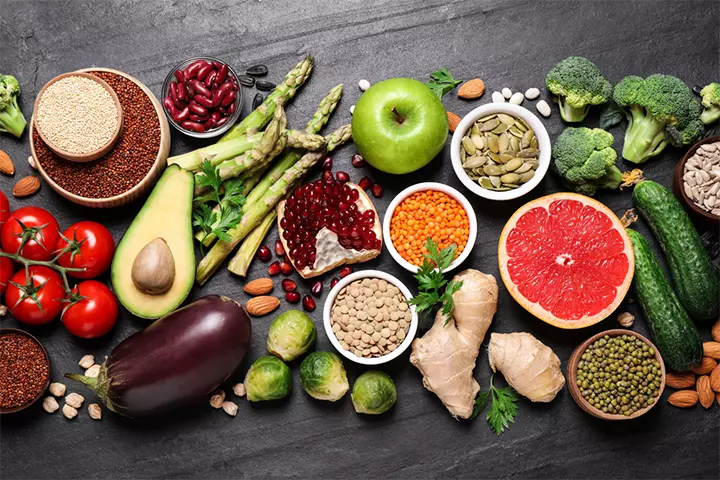
Image: Shutterstock
The following tips could help you avoid overdosing on vitamin A.
- Avoid taking vitamin A supplements if you consume food preparations made with liver during pregnancy frequently.
- Speak to your doctor before taking any prenatal vitamin supplements to prevent overdosing.
- Generally, multivitamins proposed to pregnant women contain a number of vitamin A units.
- Include vitamin A-rich fortified foods as part of a balanced diet and avoid overeating a specific food item. You may speak to a dietician who can design a diet plan for adequate vitamin A intake based on your age and pregnancy trimester.
Frequently Asked Questions
1. Why does vitamin A cause congenital disabilities?
A study published in The New England Journal of Medicine states that retinoids (retinol) may pose teratogenic properties. A teratogenic substance acts on the embryo and leads to its abnormal development. These teratogenic effects of retinoids (not carotenoids) result in congenital disabilities in a developing fetus (5) (6).
2. Are vitamin A skin creams safe to use during pregnancy?
The role of vitamin A in maintaining skin integrity has made it a crucial ingredient in many skin care products. Although the rate of absorption into the skin is low, you may still avoid them to be on the safe side. Physicians usually prescribe creams devoid of vitamin A or retinol derivatives during pregnancy (7).
3. Which vitamins should you avoid when pregnant?
You should avoid taking multivitamins with vitamin A and exclusive vitamin A supplements during pregnancy unless directed otherwise by your doctor (8).
4. What are the signs of Vitamin A deficiency during pregnancy?
Vitamin A deficiency (VAD) during pregnancy can cause issues like a weaker immune system, difficulty mobilizing iron, and problems with how cells grow and function. These can further lead to more severe health problems such as anemia, slowed growth, infections, and xerophthalmia, which causes dry eyes and vision problems (9).
A balanced and healthy diet can usually meet your daily requirements of vitamin A in pregnancy. The body always has a store of vitamin A. Consult a physician for a checkup before conception. If you have low levels of vitamin A in your body, your healthcare provider may prescribe a supplementation plan to improve vitamin A levels for a healthy pregnancy.
Infographic: Why To Include Vitamin A In Pregnancy Diet?
From eggs, lean meat, and dairy products to fresh fruits and vegetables, various dietary sources of vitamin A are recommended for pregnant women. However, at the same time, its overconsumption can be harmful as well. So, if you’re curious why pregnant women need vitamin A, check out our infographic below to know in detail.

Illustration: Momjunction Design Team
Illustration: Vitamin A In Pregnancy: Importance Dosage And Sources

Image: Dalle E/MomJunction Design Team
References
- Vitamin A.
https://nutritionsource.hsph.harvard.edu/vitamin-a/ - Vitamin A And Pregnancy: A Narrative Review
https://www.ncbi.nlm.nih.gov/pmc/articles/PMC6470929/ - Vitamin A.
https://ods.od.nih.gov/factsheets/VitaminA-HealthProfessional/ - Vitamin A Toxicity And Birth Defects.
https://www.jandonline.org/article/S0002-8223(97)00119-3/fulltext - RetinoidsAs Teratogens.
https://embryo.asu.edu/pages/retinoids-teratogens - Teratogenicity Of High Vitamin A Intake.
https://www.nejm.org/doi/10.1056/NEJM199511233332101?url_ver=Z39.88-2003&rfr_id=ori:rid:crossref.org&rfr_dat=cr_pub%20%200www.ncbi.nlm.nih.gov - Safety Of Skin Care Products During Pregnancy
https://www.ncbi.nlm.nih.gov/pmc/articles/PMC3114665/ - Vitamins and supplements in pregnancy.
https://www.nhs.uk/start-for-life/pregnancy/vitamins-and-supplements-in-pregnancy/ - Sabina Bastos Maia, et al.; (2019); Vitamin A and Pregnancy: A Narrative Review.
https://www.ncbi.nlm.nih.gov/pmc/articles/PMC6470929/#:~:text=Vitamin%20A%20is%20important%20for - Vitamin A supplementation during pregnancy for maternal and newborn health outcomes.
https://www.cochrane.org/CD008666/PREG_vitamin-supplementation-during-pregnancy-maternal-and-newborn-health-outcomes
Community Experiences
Join the conversation and become a part of our nurturing community! Share your stories, experiences, and insights to connect with fellow parents.
Read full bio of Dr. Ben Abbes Taarji Hicham
Read full bio of Sindusha MS
Read full bio of Swati Patwal
Read full bio of Aneesha Amonz







